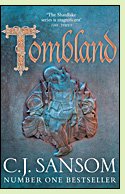Tombland
by C.J. Sansom
Reviewed by Margaret Tomlinson

Tombland is the seventh novel in
the Matthew Shardlake mystery series featuring a hunchbacked lawyer in Tudor
England. As long and meaty as the first six, it's rich with historical detail underpinned
by solid research. This novel takes us into the reign of Henry VIII's eleven-year-old
son, Edward VI, and, before long, into a camp of rebels led by yeoman farmer
Robert Kett.
Sansom
lucidly conveys the complex political situation, the causes behind the rebellion,
and the sometimes surprising alliances among the rebels and their opponents.
And yes, a murder mystery kicks off the story and is ultimately solved,
although for long stretches Shardlake and his companions are so ensnared in the
events of Kett's Rebellion that the mystery's thread―though never quite lost―grows
thin.
Summoned
by sixteen-year-old Princess Elizabeth to investigate the death of a Boleyn
relation's first wife, Shardlake must navigate a difficult political web. With her
jealous sister Mary in the ascendant, Elizabeth must keep a low profile but
is determined to assure justice for her relation. His first wife has long been
presumed dead, but now, years after his remarriage, she has turned up dead in
a scandalous condition, and he is accused―probably wrongly―of murdering her. In
the thick of the investigation, Shardlake is captured by Kett's rebels, who need
his legal expertise to assure that their trials of their oppressors follow correct
legal procedure.
As always, Sansom's characters are true to their time while also being rounded human beings whose behavior is readily believable for modern readers. The intense partisanship of various characters on one side or the other, not always for fully rational reasons, has its counterpart today. In Edward VI's reign, the issues revolved around wealthy landowners taking over common grazing lands and fattening their income from sheep while the peasants who should have been entitled to use the land starved. If sheep are not at the center of today's controversies, the issue of widening income inequality remains hot. (2018; 806 pages, including a historical essay and bibliography following the novel)
More about Tombland at Powell's Books or The Book DepositoryOther mysteries set in the Tudor period:
The Tudor Secret by C.W. Gortner (2011), about a squire who becomes a spy for Princess Elizabeth during the last days of Henry VIII’s young successor, Edward VI; #1 in the Spymaster Chronicles mystery series. See review or more info at Powell's Books.
Poison, Your Grace by Peg Herring (2011), about Princess Elizabeth and an apothecary's apprentice investigating the poisoning death of an adviser to the young King Edward VI; #2 in the Simon and Elizabeth mystery series. More info
The Poyson Garden by Karen Harper (1999), featuring the sleuthing abilities of the future Queen Elizabeth I; #1 in the Bess Tudor mystery series. More info
Nonfiction about the 1549 rebellions:
Kett's Rebellion: The Norfolk Rising of 1549 by Stephen K. Land (1977). More info
Revolt of the Peasantry, 1549 by J. Cornwall (1978). More info
The Voices of Morebath: Reformation and Rebellion in an English Village by Eamon Duffy (2001). More info
Online:
Kett's Rebellion at britainexpress.com
Back to Novels of the Renaissance
Back to Directory of Book Reviews